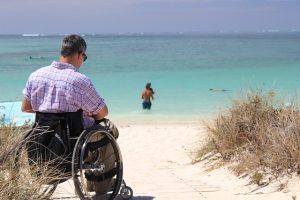Less systemic inflammation. Better immune function. Selenium is an essential trace element. Our cells cannot synthesize it. We must get it as a part of our diets. Adequate intakes are necessary for optimal immune system function.

Unfortunately, many of us live in regions with selenium-poor soil and selenium-poor crops and fruits. We do not get sufficient selenium from our food [Stoffaneller & Morse 2015]. Adequate selenium intake and status are vital. There are increased health risks associated with selenium deficiency.
What Defines Selenium Deficiency?
Data from the BIOSTAT-CHF observational cohort study indicate that serum selenium concentrations under 70 mcg/L constitute a deficiency status. Serum selenium concentrations under 100 mcg/L constitute a sub-optimal status [Bomer 2020].
In a review article, Professor Margaret P. Rayman, University of Surrey, Guildford, UK, has reached the conclusion that a serum selenium concentration of around 125 mcg/L represents the optimal selenium status [Rayman 2020, figure 2].
Biomarkers of selenium status decline considerably in the following conditions. They often reach critically low concentrations [Schomburg 2021]:
- selenium-poor diets
- pregnancy
- severe illness
- COVID-19 illness
Moreover, declining selenium status has been associated with the following clinical conditions [Schomburg 2021]:
- acute and chronic inflammation
- bacterial and viral infections
- burn injury
- childbirth
- surgical interventions
- trauma
Adequate Selenium Status for Adequate Immune Function
First of all, we need a sufficiently high selenium status as a prerequisite for an adequate immune response. In regions with marked selenium deficiency, preventable endemic diseases are known to occur with greater frequency. Moreover, selenium deficiency is associated with an increased risk for autoimmune disease.
According to Professor Lutz Schomburg, Charité-Berlin, the research literature shows positive effects on the immune system associated with selenium supplementation in pregnancy, autoimmune thyroid disease, and recovery from severe illness. However, he notes that some of the studies reported no result associated with supplementation. Furthermore, he notes that the database of relevant literature is small. In addition, few of the studies are of the gold standard randomized controlled trial variety [Schomburg 2021].
There is a pressing need for research into the relationship between autoimmune diseases and selenium deficiency. This is particularly true as it relates to rheumatoid arthritis and type 1 diabetes mellitus.
Selenium Deficiency and the Risk of Autoimmune Disease
The point of Professor Schomburg’s review is that severe selenium deficiency may trigger autoimmune disease in susceptible individuals. We can help ourselves by having our serum selenium status tested to see if we are close to the desirable 125 mcg/L level.
To decrease the risk of autoimmune disease and possibly to improve the course of autoimmune diseases, we can make improved food choices. We may elect to take a selenium supplement in order to avoid severe selenium deficiency.
Health Risk of Selenium Deficiency Often Neglected
Professor Schomburg regards it as unfortunate that the health risks of selenium deficiency are often neglected while the possible side effects of selenium supplementation are exaggerated. This leads to a disregard on the part of health professionals and the general public of what are “safe and promising preventive and adjuvant treatment options.”
In Professor Schomburg’s opinion, this situation is especially unfortunate in cases involving pregnancy, severe illness, or COVID-19. In these conditions, massive selenium deficiencies can develop and are associated with increased autoimmune disease risk, long-lasting health impairments, and slow recovery [Schomburg 2021].
In Figure 4 in his review article, Professor Schomburg [2021] indicates the following danger zone status and replete status for individuals:
- danger zone: below 45 mcg/L
- replete zone: above 90 mcg/L
Also interesting in Professor Schomburg’s Figure 4 is the correlation between selenium status and selenoprotein P status. Selenoprotein P is the most common selenoprotein in the blood circulation [Schomburg 2021].
- It is the primary transporter of selenium in the blood.
- It is both a mediator of hierarchical selenium supply and a good indicator of selenium status
Conclusion: Selenium Supplementation for Optimal Immune Function
Professor Schomburg states that supplemental selenium can be toxic and even fatal. However, he notes that the dosages that cause acute selenosis are much higher than the recommended amounts supplied by high-quality supplements and used in clinical studies. In clinical studies, up to 200 mcg per day has proven safe, regardless of the type of seleno-compound used [Schomburg 2021].
Both the European Food Safety Authority and the Nordic Nutrition Recommendations have set the tolerable upper intake limit at 255 mcg/day [EFSA 2023; Blomhoff 2023].
Sources
Blomhoff R et al. Nordic Nutrition Recommendations 2023 – Integrating Environmental Aspects. Copenhagen: Nordic Council of Ministers, 2023.
Bomer N, Grote Beverborg N, Hoes MF, Streng KW, Vermeer M, Dokter MM, IJmker J, Anker SD, Cleland JGF, Hillege HL, Lang CC, Ng LL, Samani NJ, Tromp J, van Veldhuisen DJ, Touw DJ, Voors AA, van der Meer P. Selenium and outcome in heart failure. Eur J Heart Fail. 2020 Aug;22(8):1415-1423.
EFSA Panel on Nutrition, Novel Foods and Food Allergens. Scientific opinion on the tolerable upper intake level for selenium. EFSA J. 2023 Jan 20;21(1):e07704.
Rayman MP. Selenium intake, status, and health: a complex relationship. Hormones (Athens). 2020 Mar;19(1):9-14.
Schomburg L. Selenium deficiency due to diet, pregnancy, severe illness, or COVID-19-a preventable trigger for autoimmune disease. Int J Mol Sci. 2021 Aug 8;22(16):8532.
Stoffaneller R, Morse NL. A review of dietary selenium intake and selenium status in Europe and the Middle East. Nutrients. 2015 Feb 27;7(3):1494-537.
The information presented in this review article is not intended as medical advice and should not be used as such.
15 April 2024
